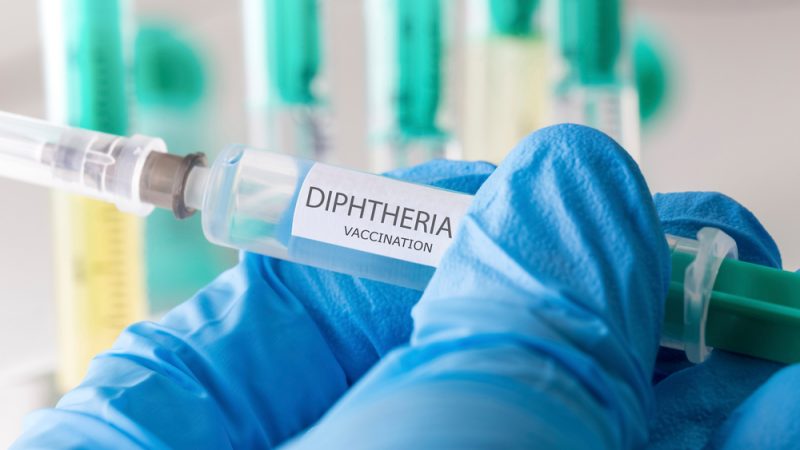By Asmau Ahmad
A public health physician and President, of the HealthCare Providers Association of Nigeria, Dr Austin Aipoh, has advised parents and caregivers in the Federal Capital Territory, Abuja and other parts of the country to ensure that their children under one year are fully vaccinated with pentavalent vaccines and other childhood vaccines.
This followed an alert on the outbreak of diphtheria infection in some parts of Abuja by the Federal Capital Territory Administration.
Dr Aipoh said diphtheria is a vaccine-preventable disease and therefore, no child should die from it.
He Aipoh noted that keeping up to date with recommended vaccines is the best protection against diphtheria.
According to the Nigeria Centre for Disease Control (NCDC), diphtheria is a serious bacterial infection caused by the bacterium called Corynebacterium species that affects the nose, throat, and sometimes, the skin of an individual
A person with diphtheria has a sheet of thick, grey matter covering the back of the throat, making breathing hard.
The spread of the disease is by airborne respiratory droplets (coughs or sneezes); saliva (kissing or shared drinks).
The Director of Public Health, FCTA, Dr Sadiq Abdulrahman, while announcing the outbreak of diphtheria within the FCT, revealed that it had already claimed the life of a child, who was part of the eight cases recorded.
He called on residents of the FCT to immediately take the vaccine (Pentavalent vaccine) to break the spread of the disease, which he explained is an infection of the nose and throat, adding that it is easily preventable by the vaccine.
According to the director, results of samples taken from suspected cases in a village close to Dei-Dei community, have established the breakout.
He noted that a household of four persons had been identified in the area, and while some of the results came positive, one of the family members, an infant of about four-year-old, died of the disease.
Data from NCDC showed that in January this year, there was an outbreak of diphtheria in three states, Lagos, Kano and Ondo respectively.
Speaking with our correspondent, Dr. Aipoh said the outbreak of the disease was a clear indicator of poor immunisation performance in the affected areas in the FCT.
He said, “Diphtheria is part of the immunisation schedule, maybe the parents didn’t take the child for immunisation. All children born in Nigeria these days take the diphtheria vaccine. So, for all the babies that took it, they will not have diphtheria.
“I am sure that they delivered the baby at home or by Traditional Birth Attendants. Parents should make sure that they immunise their children even when they are born at home or by TBAs.
“Diphtheria is part of the National Immunisation Schedule. I am sure that the child died because the parents didn’t do what they were supposed to do.”
The public health expert explained that noted that in the Nigerian childhood immunisation schedule, three doses of pentavalent vaccine (diphtheria toxoid-containing vaccine) are recommended at the 6th, 10th, and 14th week of life.
The World Health Organisation (WHO) recommends a three-dose series of diphtheria toxoid-containing vaccines in the first year of life beginning at six weeks of age and advises that three booster doses of diphtheria toxoid-containing vaccine are provided during childhood and adolescence to ensure long-term protection.
Dr Aipoh said, “A child can only die from diphtheria if the child is not immunised. Every baby born must go through the immunisation schedule. Parents should avail their children of the opportunity to get immunised during the house-to-house immunization programme.
“They should ensure that they give their children a complete immunization schedule. If a child receives complete immunisation, we will not be having this type of problem.”
The expert said symptoms of the disease include fever, runny nose, sore throat, cough, red eyes, neck swelling, and difficulty breathing.
“Diphtheria spreads easily between people through direct contact with infected people, droplets from coughing or sneezing and contact with contaminated clothing and objects,” he added.
Aipoh further emphasized the importance of maintaining good personal hygiene and environmental sanitation, noting that it is crucial in preventing the spread of the infection.
The American Academy of Paediatrics says diphtheria can also lead to heart failure, paralysis, and even death and advised, “Make sure to vaccinate to help keep this dangerous infection from your kids.”
The NCDC said diphtheria infection is treated with a diphtheria antitoxin administered intravenously or through an intramuscular injection.
The health agency said that antibiotics could also be given to eliminate the bacteria to prevent transmission to others.


